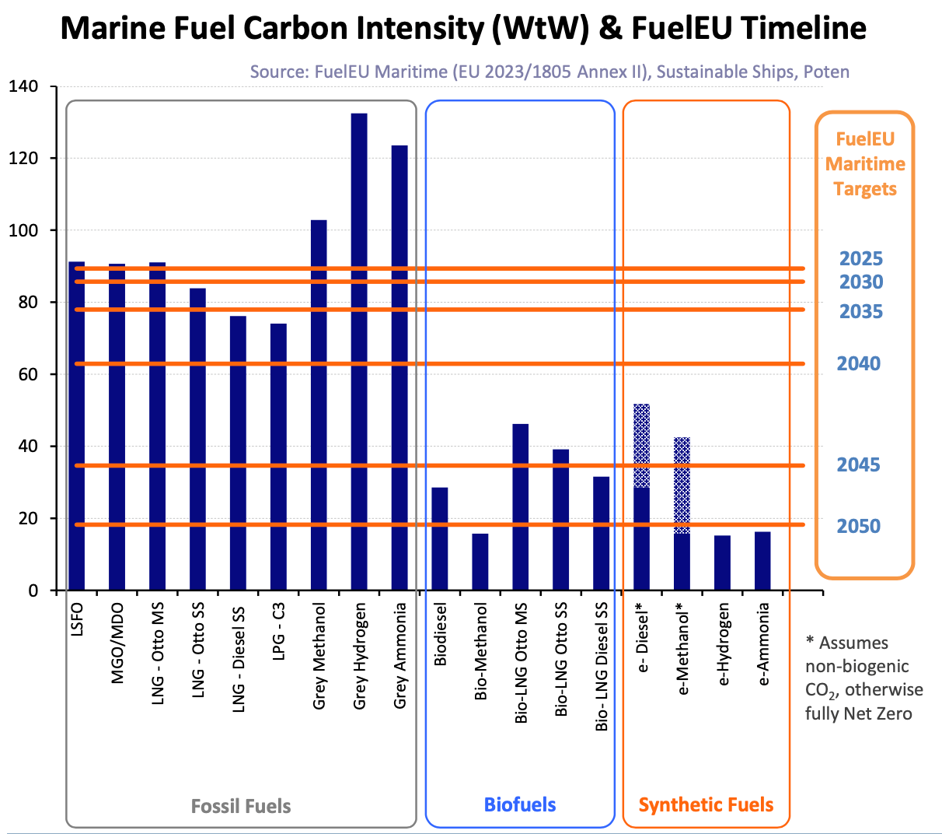During the 2025 GREEN4SEA Athens Forum, Nikos Xydas, Technical Director, World Liquid Gas Association (WLGA), focused on the prospects of using LPG (liquefied petroleum gas) as a marine fuel, highlighting its benefits and growing adoption within the industry.
There’s a need for green solutions as the shipping industry faces increasing pressure to adopt greener solutions due to the International Maritime Organization’s (IMO) greenhouse gas (GHG) reduction strategy.
Several regulatory milestones are forcing the maritime industry to transition to cleaner fuels more rapidly.
Starting in 2025, the EU’s FuelEU regulation mandates a 2% reduction in the lifecycle GHG intensity of bunker fuels compared to 2020 levels, rising to 6% by 2030, and gradually reaching an 80% reduction by 2050.
Additionally, the Mediterranean Sea will become an Emission Control Area (ECA) for sulfur oxides (SOx) starting May 1, under MARPOL Annex VI Regulation 14.
Liquefied Petroleum Gas (LPG) and Dimethyl Ether (DME) hold significant potential as sustainable fuels for the shipping industry, although their full potential is still somewhat underappreciated.
LPG’s environmental performance
LPG offers one of the best environmental profiles among alternative fuels. WLGA well-to-wake analysis confirms that LPG, along with DME, provides excellent energy density and a clear path towards decarbonization.
 LPG is not only cost-effective but also benefits from an established global infrastructure of storage and terminal networks, which supports its widespread use.
LPG is not only cost-effective but also benefits from an established global infrastructure of storage and terminal networks, which supports its widespread use.
Additionally, it has a lower capital expenditure (capex) than many other alternatives, making it an attractive option for shipping companies.
LPG also pairs well with green technologies, such as Carbon Capture and Storage (CCS) and wind power, further reinforcing its suitability as a sustainable fuel.
LPG: A competitive fuel
The carbon footprint of LPG depends on how it is produced. According to the California Air Resources Board (CARB), LPG has a CO2 equivalent of approximately 80 grams per megajoule (gCO2e/MJ), with WLGA data suggesting it is closer to 76 gCO2e/MJ.
This puts LPG in direct competition with LNG and makes it a viable candidate to meet EU fuel regulations for the next 15 years, even without the inclusion of renewable alternatives.
Furthermore, LPG is seen as one of the most cost-effective fuels for meeting low-carbon emission standards, with its pricing being highly competitive compared to LNG and much cheaper than biofuels like B30 biodiesel and bio-methanol.
Additionally, its carbon footprint is expected to improve even further, with the potential for renewable LPG to play a significant role. By 2050, the estimation is that between 60 and 120 million tons of renewable LPG could be available, depending on regulatory support and feedstock availability.
LPG offers several environmental benefits, including virtually no sulfur oxide (SOx) emissions and reduced nitrogen oxide (NOx) emissions.
Moreover, combined with advanced technological design, LPG can achieve more than a 30% reduction in greenhouse gas (GHG) emissions compared to low sulfur fuel oil (LSFO).
FuelEU Maritime baseline reductions allow LPG to remain a viable fuel option for shipping until at least 2040, with potential extensions through carbon capture and storage (CCS) or offsetting carbon emissions.
The use of renewable LPG (rLPG) could extend its viability even further.
Current uptake for LPG dual-fueled vessels
The uptake of LPG-fueled vessels is steadily increasing. More than 285 engines powered by LPG have been ordered, with some already delivered and operational.
Currently, there are 154 LPG carriers on the water, including 17 retrofitted VLGCs (Very Large Gas Carriers), and 116 new LPG carriers are on order, with deliveries expected by 2028. Additionally, 15 ammonia carriers will be powered by LPG.
By 2026, LPG carriers are expected to consume about 1 million tons of LPG annually, saving more than 2 million tons of CO2e emissions each year. This growing demand for LPG-powered vessels reflects the fuel’s potential as a mainstream solution for shipping.
Future potential
As the shipping industry aims for net-zero emissions by 2050, approximately 13,500 existing vessels will need engine conversions to use alternative fuels. LPG, along with DME, presents a promising fuel option to help meet this goal.
Furthermore, LPG, alongside DME, offers a strong future for the shipping industry, particularly as we move toward renewable and bio-based fuels. Renewable LPG (rLPG) is already being produced in small volumes, with facilities currently producing or planning to produce renewable versions of LPG.
This renewable fuel has the potential to play a critical role in achieving the shipping industry’s decarbonization goals, particularly when combined with CCS. Its ability to significantly reduce emissions while remaining cost-competitive makes it an excellent option for achieving sustainable decarbonization goals in the shipping industry.
With its low environmental impact, flexibility, and scalability, LPG, along with DME, is a credible pathway towards net zero.
The views presented are only those of the authors and do not necessarily reflect those of SAFETY4SEA and are for information sharing and discussion purposes only.
Above article has been edited from Nikos Xydas’ presentation during the 2025 GREEN4SEA Athens Forum.
Explore more by watching his video presentation here below

































































